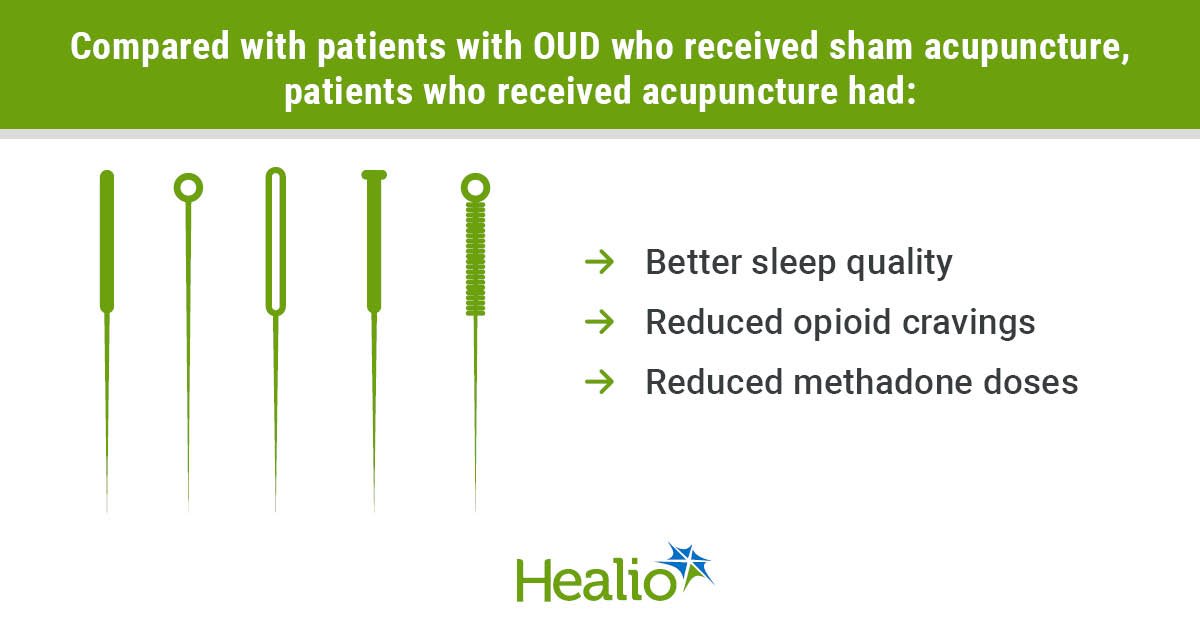Highlights:
- Overall, 62% of patients who received acupuncture experienced a 20% or greater reduction in their methadone dosage.
- Acupuncture also reduced mean opioid craving scores compared with sham acupuncture.
Study results showed that acupuncture was superior to sham acupuncture in reducing methadone dosage and opioid cravings in patients being treated for opioid addiction.
according to Li-Min Lu, MD According to researchers from Guangzhou University of Traditional Chinese Medicine and their colleagues, methadone maintenance therapy (MMT) has been shown to reduce opioid use in patients with opioid use disorder (OUD), but “side effects such as constipation, dizziness, and weakness are also widely reported.”

“As a result, many MMT patients need to or have reduced their methadone dosage,” they wrote. Annals of Internal Medicine“However, as methadone dosages are tapered, MMT patients often experience persistent withdrawal symptoms, including anxiety, depression, insomnia and increased cravings for opioids.”
The researchers conducted a randomized sham-controlled trial, assigning Chinese participants aged 65 years or older with OUD who had been using MTT for at least 6 weeks to receive acupuncture (n = 60) or sham acupuncture (n = 58) 3 times per week for 8 weeks. Primary outcomes included a ≥20% reduction in methadone dose and opioid craving, which Lu et al. measured with a 100-mm visual analog scale (VAS).
After 8 weeks, 62% of patients receiving acupuncture had reduced their methadone dosage by 20% or more compared with 29% of patients receiving sham acupuncture (risk difference = 32%; 97.5% CI, 13-52).
Patients who received acupuncture also had a greater reduction in mean opioid craving VAS scores compared with patients who received sham acupuncture (mean difference = –11.7 mm VAS; 95% CI, –18.7 to –4.8 mm).
Additionally, Lu et al. found that people who received acupuncture had less decline in Pittsburgh Sleep Quality Index scores compared with those who received sham acupuncture (MD = –2.3; 95% CI, –3.4 to –1.2), which they noted was an important finding.
“[Some] “Our results suggest that acupuncture may be a potential treatment for sleep disorders during morphine withdrawal by significantly increasing REM sleep, non-REM sleep, and total sleep time,” the researchers wrote.
Of note, the researchers found no serious adverse events and no differences between groups when they asked participants which acupuncture treatment they received.
As for the explanation behind the findings, Lu and his colleagues write, “Some researchers suggest that the mechanism by which acupuncture reduces drug craving is through increased levels of endogenous opioids and hormones, such as endorphins, enkephalins, adrenaline, noradrenaline, serotonin, and dopamine, in the central nervous system and plasma.”
They concluded that future studies are needed to “measure long-term clinical outcomes and determine how acupuncture can best be incorporated into comprehensive substance abuse treatment programs.”
Still, “we believe that these findings support consideration of acupuncture for methadone tapering in individuals receiving MMT,” the researchers added.

